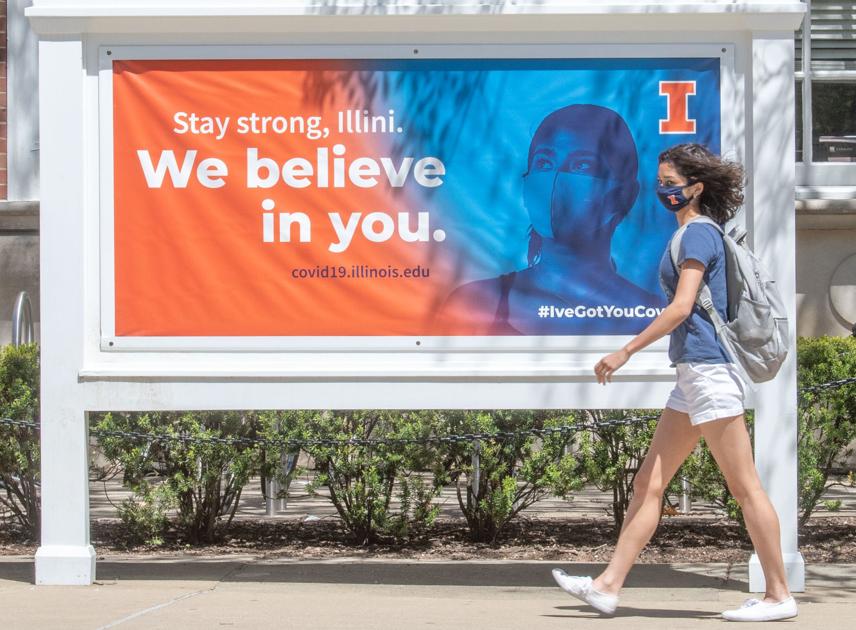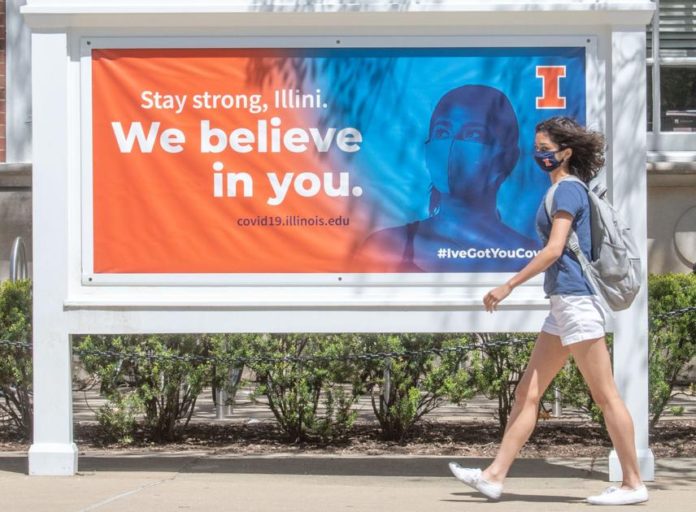
URBANA — For months, thousands of students and employees at the University of Illinois have been spitting into tubes twice a week to get tested for COVID-19.
The much-praised testing program was ramped up quickly last summer, and with the announcement this week that those who are vaccinated won’t have to get tested this fall, it will likely serve a fraction of the campus population next semester.
“That’s the plan, that we would not need nearly so much testing infrastructure,” UI epidemiologist Rebecca Smith said. “We’re not going to do away with it entirely because we would want to be able to ramp up if necessary. But hopefully, we’ll be able to ramp it down.”
That likely means there will be fewer than the 10 testing sites currently on campus, she said, though that hasn’t been decided.
Removing sites “might matter if it makes it less convenient for those people who need to test to be compliant,” said Nigel Goldenfeld, a UI physics professor and COVID-19 modeler. “We have factored this into our thinking, and we will see as the situation becomes clearer.”
In recent months, faculty senators have been asking administrators about reducing the testing frequency.
“I’ve heard a fair bit, if you will, of complaints associated with the amount of time that people invest in the testing program,” Gay Miller, a professor in the College of Veterinary Medicine, said in March. “I think if there are people who will be motivated to be vaccinated if they can avoid the testing come this fall, that is something important to consider.”
Provost Andreas Cangellaris said that was already being considered, and last week, the UI announced that people who are vaccinated will not have to continue getting tested this fall, and possibly sooner.
People who aren’t vaccinated will have to continue getting tested to be able to access campus buildings.
“I think it’s a good decision,” Miller said after the new policy was announced. “I’ll hope it continues to hold through the fall, and I’ll hope that all the students and faculty and staff get vaccinated.”
Education Professor Nicholas Burbules said he hopes the decision serves as an incentive to get vaccinated.
“The twice-a-week testing — I’ve been doing it consistently, but it’s a burden, and my hope is that making this link, that if you get vaccinated, then you don’t have to test as often or at all, is an incentive for people to get vaccinated,” he said.
Burbules said he’d prefer to incentivize people to get vaccinated, rather than mandate it.
“One of the good things about our university and how we’ve handled it is that we don’t necessarily have to have a vaccine mandate to achieve a very high level of safety. What we’ve done so far, I’m very proud of,” he said. “In general, I would prefer finding positive incentives to get people to voluntarily do it rather than requiring it.”
According to a survey the UI conducted last month, about 90 percent of students have either been vaccinated or plan to do so.
UI junior and resident assistant Dana Yun said most of the students she’s talked with are excited to get vaccinated, with people in her major messaging each other when new appointments are available.
“Some are trying to get appointments and can’t,” she said. “It can be frustrating not to get an appointment, but I’m glad that the appointments are being filled.”
Yun said one student she knows is waiting to get a vaccine until more research is done on their long-term safety, but “a lot of my residents are really excited.”
She said some students want to get vaccinated so they can go home over the summer and be with family, and others are simply ready for in-person classes to return in the fall.
Students are in the process of signing up for fall classes, and Yun said they’re excited to see classes listed as being in-person.
“After a year-and-a-half of online schooling, it’s just not as effective, so students are excited to return,” Yun said.
Yun and UI Student Trustee Ali Mirza said the testing requirement wasn’t much of a hassle, at least if you were living on campus.
“Especially with the warmer weather, students are generally leaving their apartments or dorm rooms more often,” Mirza said. “With the multiple testing centers, it’s easy to find yourself near one and quickly get tested. For those who live off campus, it can be a bit more challenging to frequently get tested, but for me, it hasn’t been an issue.”
Goldenfeld and Smith said the UI isn’t dropping the testing requirement for those who are vaccinated to try to incentivize vaccination, but that is an added bonus.
“We would not make the announcement if the science didn’t back it up, but the incentive is definitely a bonus,” Smith said.
Goldenfeld and Smith said the science is clear that the vaccines are effective and that even reduced testing frequency shouldn’t be necessary.
“The science about the vaccines is remarkably clear and consistent. They are very effective!” Goldenfeld wrote in an email. “Seniors who are fully vaccinated are 94 percent less likely to be hospitalized than those of the same age who are not vaccinated!”
The COVID-19 vaccines are more effective than the annual flu shot, which Goldenfeld said the CDC estimates reduce the risk of illness by about 40 to 60 percent.
He also cited a CDC study of health-care workers who were tested weekly that found a 90 percent reduction in infections, whether symptomatic or not.
“The COVID vaccines are quite miraculous,” he wrote.
Goldenfeld said a study from Israel’s mass vaccination campaign found a much smaller viral load among vaccinated people compared to those who weren’t.
“This is highly likely to translate into reduced transmission, because if you don’t have much virus, or you only have it for a short period of time, then you can’t transmit it to others,” he wrote. “But we don’t yet have a direct measure of how much transmission is reduced by vaccination.”
UI students are currently participating in a trial that seeks to answer this question.
“Although people who are vaccinated can get infected, their infections are more mild and less likely to be infectious, and so it makes sense that we don’t need to conduct surveillance testing among asymptomatic, vaccinated people,” Smith said.
People who are already vaccinated will be able to upload their records to the UI’s McKinley Health Center, whose staff will verify the records with the state’s database, Smith and Goldenfeld said.
They’ll also be able to share their vaccination with the Safer Illinois app, which displays their building-access status.
The app’s developer, Bill Sullivan, said that feature would be opt-in and not required.
“We have built into Safer Illinois the capacity to have a student or employee opt-in to having their vaccination status shared with the app,” he wrote in an email. “If they opt in, 14 days after they have received their last vaccination shot, the app will show their building entry status as ‘Granted’ and they will no longer be required to participate in the saliva test (and get a negative test) in order to enter a campus building.”
Goldenfeld and Smith said they considered only reducing the frequency of testing for vaccinated people, but ultimately decided that wouldn’t make much sense.
Goldenfeld said testing weekly or monthly wouldn’t be frequent enough to catch most people early enough in their infection cycle when they’re still contagious, so it wouldn’t do much good at reducing the spread of COVID-19.
“If you are vaccinated and you become infected, the likelihood that you’ll be an active infection for more than a day or two is quite small,” Smith said. And “if they are not infectious, the question is, how important is it to find non-infectious, non-symptomatic infections?”
While the vaccines are good news, they’re not 100 percent effective, which is why the UI will still be requiring masks and social distancing, Smith said.
“Vaccinated people can still get infected,” Smith said. “And while fully vaccinated people are much less likely to have symptoms, we still don’t know long term if that infection of vaccinated people has an impact on their long-term health.”
And Smith and Goldenfeld said the guidelines are subject to change as the science and CDC guidelines are updated and variants spread.
“If variants of concern emerge and become so prevalent that they render vaccination less effective, we may need to revisit testing in the future,” Goldenfeld said.
“We are following the science as best we can,” Smith said. “We’re listening to the experts, and we’re looking at the data ourselves, so you can be sure that we will adjust as we know more.”







